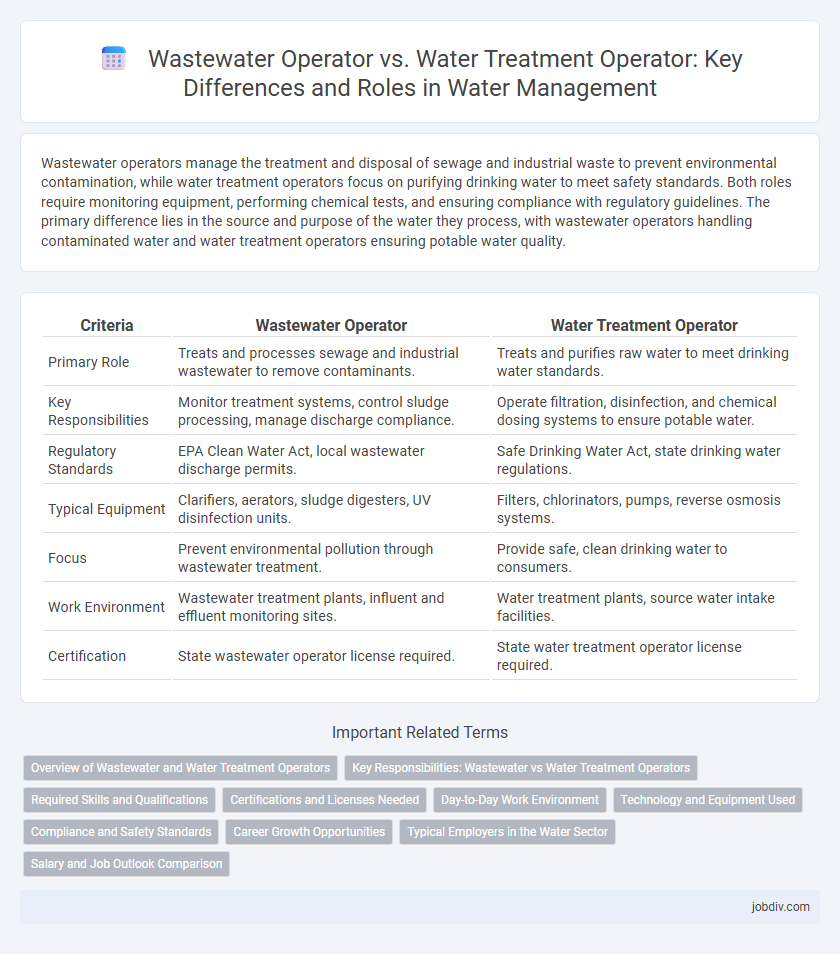Wastewater operators manage the treatment and disposal of sewage and industrial waste to prevent environmental contamination, while water treatment operators focus on purifying drinking water to meet safety standards. Both roles require monitoring equipment, performing chemical tests, and ensuring compliance with regulatory guidelines. The primary difference lies in the source and purpose of the water they process, with wastewater operators handling contaminated water and water treatment operators ensuring potable water quality.
Table of Comparison
| Criteria | Wastewater Operator | Water Treatment Operator |
|---|---|---|
| Primary Role | Treats and processes sewage and industrial wastewater to remove contaminants. | Treats and purifies raw water to meet drinking water standards. |
| Key Responsibilities | Monitor treatment systems, control sludge processing, manage discharge compliance. | Operate filtration, disinfection, and chemical dosing systems to ensure potable water. |
| Regulatory Standards | EPA Clean Water Act, local wastewater discharge permits. | Safe Drinking Water Act, state drinking water regulations. |
| Typical Equipment | Clarifiers, aerators, sludge digesters, UV disinfection units. | Filters, chlorinators, pumps, reverse osmosis systems. |
| Focus | Prevent environmental pollution through wastewater treatment. | Provide safe, clean drinking water to consumers. |
| Work Environment | Wastewater treatment plants, influent and effluent monitoring sites. | Water treatment plants, source water intake facilities. |
| Certification | State wastewater operator license required. | State water treatment operator license required. |
Overview of Wastewater and Water Treatment Operators
Wastewater operators manage the treatment and disposal of sewage and industrial waste, ensuring environmental compliance and public health protection by removing contaminants from wastewater. Water treatment operators focus on purifying drinking water by controlling filtration, disinfection, and chemical dosing processes to meet safety standards and regulatory requirements. Both roles require monitoring system performance, conducting laboratory tests, and maintaining treatment equipment to optimize water quality and operational efficiency.
Key Responsibilities: Wastewater vs Water Treatment Operators
Wastewater Operators manage and monitor the treatment process that removes contaminants from sewage and industrial effluents, ensuring compliance with environmental regulations and protecting water bodies. Water Treatment Operators focus on purifying raw water from sources like rivers or reservoirs by controlling filtration, disinfection, and chemical dosing to provide safe drinking water. Both roles require maintaining equipment, collecting samples for analysis, and responding to system malfunctions, but they specialize in different stages of water quality management.
Required Skills and Qualifications
Wastewater Operators must possess strong knowledge of biological and chemical treatment processes, as well as skills in monitoring effluent quality and maintaining regulatory compliance with the EPA standards. Water Treatment Operators require expertise in water purification techniques, understanding of filtration and disinfection methods, and certification in water quality analysis to ensure safe potable water supply. Both roles demand proficiency in operating treatment plant equipment, troubleshooting system malfunctions, and knowledge of state-specific licensing requirements.
Certifications and Licenses Needed
Wastewater operators require certification that typically involves state-specific licensing exams focusing on sewage treatment processes, regulatory compliance, and safety protocols. Water treatment operators must obtain licenses that verify their knowledge of drinking water standards, filtration, disinfection methods, and distribution system management. Both roles demand ongoing education to maintain certifications and ensure adherence to evolving environmental regulations and public health standards.
Day-to-Day Work Environment
Wastewater operators manage the collection, treatment, and disposal of sewage and industrial waste, ensuring compliance with environmental regulations in often outdoor and industrial plant settings. Water treatment operators focus on purifying drinking water by monitoring filtration, chemical treatment, and distribution systems within controlled, indoor water treatment facilities. Both roles require routine equipment maintenance, system monitoring, and adherence to safety protocols, but wastewater operators typically encounter more exposure to hazardous materials and variable weather conditions.
Technology and Equipment Used
Wastewater operators utilize advanced separation technologies like activated sludge systems, membrane bioreactors, and anaerobic digesters to remove contaminants and treat sewage effectively. In contrast, water treatment operators focus on equipment such as rapid sand filters, UV disinfection units, and chemical dosing systems to purify drinking water and ensure safety standards. Both roles require expertise in SCADA systems and real-time monitoring tools to optimize treatment processes and maintain regulatory compliance.
Compliance and Safety Standards
Wastewater operators ensure compliance with environmental regulations by monitoring effluent quality and managing toxic substances to prevent pollution. Water treatment operators maintain safety standards by controlling chemical dosing, filtration processes, and disinfection to provide potable water that meets public health requirements. Both roles require strict adherence to EPA and state guidelines to protect ecosystems and human health.
Career Growth Opportunities
Wastewater operators specialize in managing sewage treatment processes, ensuring environmental compliance and public health safety, which leads to career growth in regulatory agencies or environmental consulting firms. Water treatment operators focus on purifying drinking water, offering advancement opportunities in municipal utilities, water resource management, and infrastructure development projects. Both roles provide pathways to supervisory positions, technical specialist roles, and certifications such as Grade I-IV licenses that enhance career mobility within the water industry.
Typical Employers in the Water Sector
Wastewater operators typically find employment with municipal wastewater treatment facilities, industrial plants, and environmental services companies specializing in sewage and effluent management. Water treatment operators are commonly employed by public water utilities, government agencies, and private companies focused on potable water purification and distribution. Both roles also exist within engineering firms and consulting companies providing specialized water resource management services.
Salary and Job Outlook Comparison
Wastewater operators typically earn a median salary of around $50,000 annually, with job growth projected at 5% over the next decade, reflecting steady demand driven by aging infrastructure. Water treatment operators have a slightly higher median salary, approximately $53,000 per year, with a similar 5% job growth rate due to increasing regulations on water quality and environmental sustainability. Both roles require technical expertise in water systems, but water treatment operators may benefit from broader employment opportunities in municipal and private sectors.
Wastewater Operator vs Water Treatment Operator Infographic

 jobdiv.com
jobdiv.com